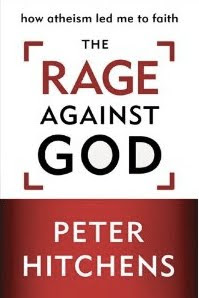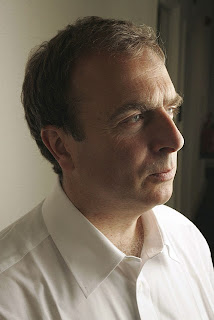
Zondervan will soon release a book that will sound immediately provocative to many. The book is titled “The Rage Against God: How Atheism Led Me to Faith” (hardcover, 224 pages, $22.99). Peter Hitchens wrote it as a testimony to his religious experience. If you have been following the “New Atheism”, you will recognize the author’s name and notice why this book is sure to pique much interest.
 Peter Hitchens is the brother of prominent atheist Christopher Hitchens. Christopher has achieved fame for writing apologetical books on anti-theism such as “God Is Not Great” and “The Portable Atheist”. He has also traveled the country debating Christian-apologist Doug Wilson on whether Christianity is even good for the world. And in one of Christopher’s most scandalizing endeavors, he savagely slandered Mother Teresa, defaming her as “Hell’s Angel” (I invite others to read what I wrote recently about Mother Teresa and decide if Christopher’s opinion seems accurate).
Peter Hitchens is the brother of prominent atheist Christopher Hitchens. Christopher has achieved fame for writing apologetical books on anti-theism such as “God Is Not Great” and “The Portable Atheist”. He has also traveled the country debating Christian-apologist Doug Wilson on whether Christianity is even good for the world. And in one of Christopher’s most scandalizing endeavors, he savagely slandered Mother Teresa, defaming her as “Hell’s Angel” (I invite others to read what I wrote recently about Mother Teresa and decide if Christopher’s opinion seems accurate).
While some New Atheists, like Richard Dawkins, at least attempt to use science and reason to explain away the possibility of God, Christopher Hitchens uses flamboyant diatribes with only a sprinkling of reason. Although many atheists affirm open-mindedness and a commitment to “follow the evidence where it leads”–as Christian Truth-seekers should as well–Christopher and many New Atheists seem close-minded in their total oppression to religion. They want to extinguish as evil anything that relates to God, vigilantly persecuting all theistic belief.
Christopher and his comrades write extremely well, which makes them particularly dangerous. Their power to evoke emotionally charged reactions from both sides of the theistic debate accounts for their popularity.
The religious community especially in England and the United States has reacted vigorously to the rise of the New Atheist literature. This new book by Peter Hitchens will surely add to that fire, but as a different type of fuel. Many books already offer rational arguments for the existence of God. They pull cool, logical demonstrations from great philosophers like St. Thomas Aquinas, Blaise Pascal, and William of Ockham that lead to the conclusion of God’s existence.
 Peter’s book, however, mainly presents an experiential narrative filled with the circumstances and cultural events that led to his full conversion to Christianity. The shortcomings of anti-theistic Europe and Asia, rather than logic, occasioned his change of heart. This contradicted what I had anticipated. I expected Peter to provide a list of rebuttals to the logical flaws in his brother’s arguments. Instead what I found was a delicate mix of providential circumstances and experiences that lead Peter down a path towards God.
Peter’s book, however, mainly presents an experiential narrative filled with the circumstances and cultural events that led to his full conversion to Christianity. The shortcomings of anti-theistic Europe and Asia, rather than logic, occasioned his change of heart. This contradicted what I had anticipated. I expected Peter to provide a list of rebuttals to the logical flaws in his brother’s arguments. Instead what I found was a delicate mix of providential circumstances and experiences that lead Peter down a path towards God.
“The Rage Against God” contains three main sections. The first section–covering more than half the book–details Peter’s journey through atheism. He shares his embrace of an arrogant, rebellious atheism that caused him to lead a lascivious, selfish lifestyle. Then he describes the post-war realities of Britain, particularly dwelling on the “pseudo-religion and cult of Winston Churchill.” He recognizes in the near-worship of Churchill the spark of religious decline in England. He sees the power, war, and military dominance of Churchill directly confronting the humility, peace, and traditions of the Church. Peter also describes his experiences as a reporter in Russia,where he interpreted the failure of Communism as the failure of atheism.
In the second section, Peter addresses what he considers to be the three failed arguments of atheism. These include the history of religious conflict, the existence of morality without God, and the failed atheism of atheistic states. I doubt that Peter’s development of these arguments would convince most atheists. He seems to have directed them mainly as responses to his brother Christopher more than anyone else.
The final section describes how the cruelty of atheistic Communist regimes reflects badly on the case for atheism. Communism–especially in the Soviet Union–tried ruling people through cold, anti-theism and clearly failed. Peter also sees the suppression of religion in Soviet Russia as a foreshadowing of the quelling of religion in the modern Western world. Thus, he uses his subjective experiences within and around atheistic culture as evidence of its falsehood. His youthful pursuits in anti-theism left him unfulfilled while his time in Soviet Russia allowed him to see the dark realities of an anti-theistic state.
“The Rage Against God” is neither a traditional book of apologetics nor an in-depth conversion story. Peter spends only a couple of short chapters detailing his progression from atheism to Christianity. But the whole book explains a gradual confirmation of his belief in God.
As an in-depth look into atheistic culture, “The Rage Against God” shows how we got to where are today. And it details the consistently tragic failures of practical atheism. As the brother of a prominent leader of New Atheism, Peter provides a unique and interesting perspective.
“The Rage Against God” deals more with history and culture than logic and reason. If you are more interested in the latter, I suggest that you couple reading “The Rage Against God” with a solid work of traditional apologetics. For example, Peter Kreeft and Ronald Tacelli’s “Handbook of Catholic Apologetics”.
For an answer to the New Atheists from an explicitly Catholic perspective, I recommend checking out Scott Hahn’s book, “Answering the New Atheism: Dismantling Dawkin’s Case Against God” (Emmaus Road, 152 pages, $12.95). Hahn’s book is really a direct rebuttal to Richard Dawkins’ writings–not to the whole New Atheist clan–but is still rich nonetheless. And it has one of the best book covers I’ve ever seen!
